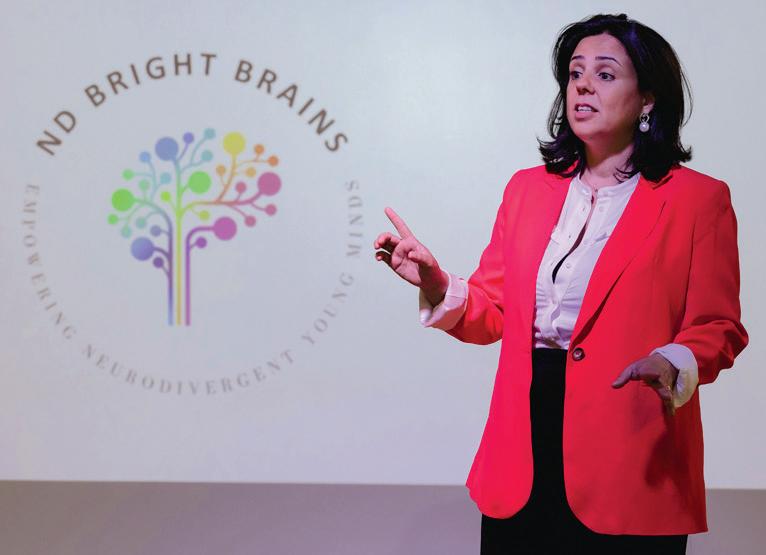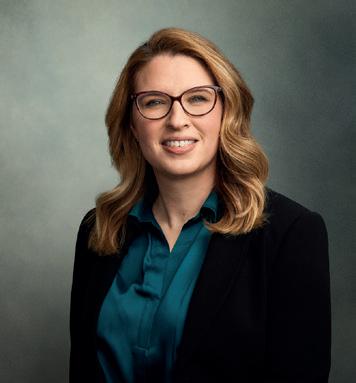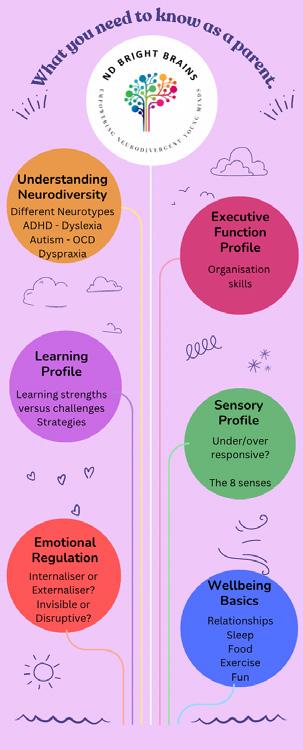
3 minute read
Unlocking Potential
Resources to support neurodiverse students
Susana Gonzalez, the director and founder of ND Bright Brains, is a passionate advocate for neurodivergent students and a firm believer that the key to unlocking their potential lies in educating both adults and children about neurodiversity. With 18 years of experience teaching science in UK secondary schools - including her role as Head through a multitude of options, but hopefully some of the tips we’ve mentioned here are a useful starting point for you, whatever your current situation.
NATALIE VERBO Director of Firefly Education www.fireflyeducation.co.uk

of Chemistry at an all-girls’ grammar school in Kingston-Upon-ThamesSusana’s journey into neurodiversity education was both professional and deeply personal.
Her transition from Science teacher to neurodiversity specialist was driven by a desire to bridge the gap between traditional education systems and the unique needs of neurodivergent students. After qualifying as a Dyslexia assessor and completing numerous courses on neurodiversity and wellbeing, Susana founded ND Bright Brains Ltd. Since then, she has trained over 1,000 teachers and parents in neurodiversity and learning strategies, while also mentoring neurodivergent (ND) young people in mainstream schools.
Susana’s work is rooted in the idea that educational settings are more suited for neurotypical brains, which can leave ND students struggling - not only with academic challenges, but also with mental and emotional exhaustion. She emphasises that supporting ND students isn’t just about providing accommodations - it’s about fostering an inclusive learning environment where learning differences are normalised and diverse strengths are recognised and celebrated.
One of her most impactful initiatives is the ND Bright Brains School, a six-week group course designed specifically for teenagers preparing for their GCSE and A Level exams. This program focuses on helping ND students develop selfawareness in various areas: familiarising themselves with their unique neurotype, identifying effective learning strategies, organisational strategies and understanding the importance of self-care. The sessions cover key areas like nutrition, exercise, rest, emotional regulation and healthy relationships. Originally launched as a lunchtime club during Susana’s time teaching at the all-girls’ grammar school, the program received such positive feedback from both students and parents that she later expanded it to private sessions.
What sets Susana’s approach apart is her firm belief that educating all adults in neurodiversity - parents, teachers, sport coaches and anyone working with children - is just as crucial as educating the students themselves. “For me, the way forward is to educate all adults in neurodiversity, but also the children, so that slowly they can become accountable and develop the confidence that comes from increased selfawareness,” she explains.
To further support parents, Susana has created the Neurodiversity Basics for Parents bookleta starting point for parents to understand how unique neurotypes occur in the human population. It highlights the importance of recognising strengths in ND children rather than focusing solely on their challenges. Understanding a child’s neurotype and advocating for their needs at school, she says, is essential to ensuring they not only cope, but thrive.
Susana is taking her mission even further with

Where do I start as a parent?
1 Educate yourself in Neurodiversity
2 Understand your child’s neurotype
3. Consider an educational assessment.
Will my child be fine in school if I get a diagnosis or EHCP?
While more schools are growing in their understanding of neurodiversity, it’s always beneficial for parents to collaborate closely with them
The more informed parents are about neurodiversity, the better equipped they’ll be to advocate for the appropriate support their child needs an online neurodiversity education talk series aimed at equipping parents with the knowledge and tools they need to support their children effectively. These sessions address the practical realities of raising ND children, offering strategies rooted in both research and Susana’s years of hands-on experience.
Through ND Bright Brains, Susana Gonzalez is not only transforming the educational experience for neurodivergent students, but also creating a ripple effect of awareness and empathy among the adults who shape their learning environments.
Susana’s work reminds us that when we embrace neurodiversity, we open the door to more inclusive, innovative and compassionate schoolsand, ultimately, a better future for all learners and a society that will benefit from the extraordinary contributions of these amazing ND Bright Brains!
SUSANA GONZALES Director and Founder of ND Bright Brains
www.go.ndbrightbrains.com/talk-series
TURN BACK TO PAGE 11 to read about Churcher’s College: An All-Through School


